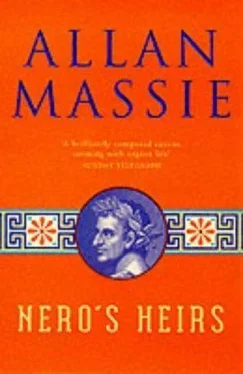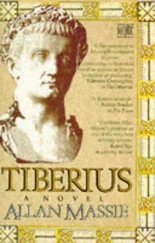Allan Massie - Nero_s Heirs
Здесь есть возможность читать онлайн «Allan Massie - Nero_s Heirs» весь текст электронной книги совершенно бесплатно (целиком полную версию без сокращений). В некоторых случаях можно слушать аудио, скачать через торрент в формате fb2 и присутствует краткое содержание. Жанр: Исторические приключения, на английском языке. Описание произведения, (предисловие) а так же отзывы посетителей доступны на портале библиотеки ЛибКат.
- Название:Nero_s Heirs
- Автор:
- Жанр:
- Год:неизвестен
- ISBN:нет данных
- Рейтинг книги:3 / 5. Голосов: 1
-
Избранное:Добавить в избранное
- Отзывы:
-
Ваша оценка:
- 60
- 1
- 2
- 3
- 4
- 5
Nero_s Heirs: краткое содержание, описание и аннотация
Предлагаем к чтению аннотацию, описание, краткое содержание или предисловие (зависит от того, что написал сам автор книги «Nero_s Heirs»). Если вы не нашли необходимую информацию о книге — напишите в комментариях, мы постараемся отыскать её.
Nero_s Heirs — читать онлайн бесплатно полную книгу (весь текст) целиком
Ниже представлен текст книги, разбитый по страницам. Система сохранения места последней прочитанной страницы, позволяет с удобством читать онлайн бесплатно книгу «Nero_s Heirs», без необходимости каждый раз заново искать на чём Вы остановились. Поставьте закладку, и сможете в любой момент перейти на страницу, на которой закончили чтение.
Интервал:
Закладка:
Curiously, it was this brutal wretch who first awoke in Domitian a warm feeling for myself. One day, when Democritos had been more than usually cruel to him, exceeding even his habitual measure of strokes, and had commanded two of our fellow-pupils to hold the boy up so that he might strike him again, something in me revolted against his barbarity. Perhaps – who knows? – I had long reproached myself for the timidity which I had displayed in tolerating the beast. Be that as it may, I now rose from my desk, ran towards him and, seizing the rod (then at the top of the backstroke) from his hand, turned it on our master, belabouring him about the neck and shoulders. 'See how you relish your own medicine,' I cried. Take that, you brute, and this, and learn to respect free-born Romans, you base Greek slave.' It was a moment of the purest exhilaration I have ever known. It could not last, of course. The brute was stronger than I and, swinging round, felled me with one blow of his fist. Then, calling on his assistant and one of our fellow-pupils to help him, he regained his rod and, when he saw I was held fast over the block, thrashed me with all his infuriated strength. He thrashed me, indeed, till I fainted, and when I recovered my senses it was to find myself alone with Domitian who was sponging my face and muttering his perplexed gratitude for my intervention. We agreed to inform my mother and his aunt of what had happened, and from that day we did not return to the torments of Democritos. From that day also, for two years or more, Domitian gave every sign of being devoted to me. I mention this because you have often observed that nothing is more common than a man's resentment of his benefactor. It wasn't like this in our case. I may say, modestly, that Domitian regarded me as his hero.
The harmony of our relationship was however to be broken. Titus returned to Rome from Africa, where he had been serving as his father's legate. He called, from courtesy, to see my mother.
'My father,' he said, 'sends you – has asked me to convey to you -the assurance of his high regard. He is fully sensible of the debt he owes you for his advancement. He has asked me to say that he is anxious to do whatever is in his power to – oh…' He broke off, and, with a sudden smile that seemed to light up our mean apartment, extended his hands in a vaguely helpless gesture and, abandoning his tone of formality, resumed: 'I'm no good at this kind of thing, my lady, though I have been trained in rhetoric. So let me put it in my own words, however loose and lacking in proper formality they may be. He's distressed to have learned of the condition in which you are obliged to live and now I see it for myself, well, I'm horrified, that a lady like you, of your birth, one who has been so kind to us, to me as a child, should be living like this. I remember that when poor Britannicus, my dearest friend, was so cruelly murdered – I can call it murder here, I suppose, though it would be as much as my life is worth to speak the word in other quarters – I remember then that when I wept, you dried my tears and comforted me, and that in the terrible days after, when I became like a little boy again, it was with your help and thanks to your sympathy and wise words that I was able to recover and resume my life. So, to see you confined in this miserable apartment makes me sad. More than that, it disgusts me. So, if there's anything I can do, anything my father can do – not that he can do much because, in my opinion, he clings to office, to his own position and perhaps even to his life by bare fingernails and fortune -well, just let me know. I really am devoted to you and your interest.'
He spoke beautifully, if a little incoherently, but that, it seemed, was evidence of his sincerity. The words tumbled forth, unbidden, straight from the heart, I couldn't doubt. My mother, of course, received them with gracious reserve, as her due. Whatever our circumstances, she was a great lady, a Claudian, while Vespasian and his family were parvenus – parvenus moreover who had not actually succeeded in arriving. But she was charmed by Titus nevertheless. Who wasn't in those days?
I have only to close my eyes to see him clearly: tall, long-legged, blond, his hair worn rather long and waved, his skin translucent, despite the African sun, nose short and straight, eyes cornflower blue, lips a little loose, the upper very slightly overhanging the lower, as if stung by a bee. And I can hear him, too: a beautiful voice, rather light, almost girlish in its upper notes, but saved from effeminacy by a few residual long Sabine vowels, caught from his father, or perhaps a childhood nurse. Then, just as his voice was rescued from the suspicion of affectation by this underlying strength, so too his manner, which might have seemed that of the self-consciously elegant dandy, was saved by a certain clumsiness – his feet were too large and he was inclined to knock things over with sudden movement.
I have given myself away, haven't I? Yes, while I listened to him and then poured him wine with a hand that I could not prevent from shaking, I fell headlong in love, as only a fourteen-year-old boy can fall in love, with an intensity in which hero-worship quite superseded any physical desire. I simply wanted to be with him, all the time from then on, to be noticed by him, cherished by him, and permitted to serve him.
I was not disappointed. Titus, though naturally I was ignorant of this, already deserved the reputation that clung to him in later years, of a great coureur – I use the Greek because we have no Latin term that so exactly fits – of both boys and women. And, if I may say so, I was in those days worth running after, and accustomed to being eyed and ogled and propositioned at the baths: I was athletic and slim; my face was framed by tumbling black curls, my skin was creamy, my eyes the darkest of browns and large, my nose straight, and my lips – as Titus was to say – were 'made for the madness of kisses'. In short, though I say it myself, in the knowledge that this passage will arouse your stern moralist's disapproval, I was what the pederasts who thronged the baths used to call in my day 'a peach'. I never allowed their admiration to go beyond flirtation, in which like so many pretty boys I excelled, taking a lively delight in fanning an ardour which I had no intention of satisfying. But it was different with Titus, though at first I took care not to allow him to gain the easy victory that I anticipated with relish.
I dwell on this, because that visit of Titus to my mother would determine the course of my life. It would lead me to action in Judaea, to military renown, to joy and heartache, and I think now that it also aroused Domitian's jealousy – though there were to be other, perhaps more substantial, reasons for that.
But now, when Titus smiled on me and said, 'I've been out of the city for so long, I'm almost a stranger. Will you be my guide, kid?' what could I do but say yes, blushing with delight and hoping that neither my mother nor Titus himself fully comprehended why the colour should flood into my cheeks?
First love… no, it is too painful to dwell on now and, besides, my old friend, it is not what you want to hear. You are interested, are you not, in political history. It was Titus, however, who aroused my interest in that, too. For him dalliance, flirtation, love-making were mere pastimes. Politics was his consuming interest, and it was not long before he began my political education, not without some disparaging remarks about his little brother Domitian, who would, he said, never amount to anything, and was not therefore worth the trouble of trying to enlighten, even on the dangers that threatened their family.
'I have to admit,' he said, 'that my father's position is precarious. He clings to office only because he has not distinguished himself in any way, and so is not seen as a threat by the buffoon on the Palatine' -this being his normal fashion of referring to the Emperor.
Читать дальшеИнтервал:
Закладка:
Похожие книги на «Nero_s Heirs»
Представляем Вашему вниманию похожие книги на «Nero_s Heirs» списком для выбора. Мы отобрали схожую по названию и смыслу литературу в надежде предоставить читателям больше вариантов отыскать новые, интересные, ещё непрочитанные произведения.
Обсуждение, отзывы о книге «Nero_s Heirs» и просто собственные мнения читателей. Оставьте ваши комментарии, напишите, что Вы думаете о произведении, его смысле или главных героях. Укажите что конкретно понравилось, а что нет, и почему Вы так считаете.












